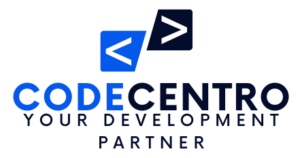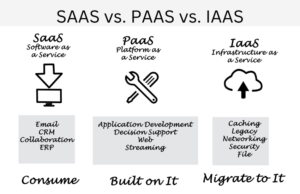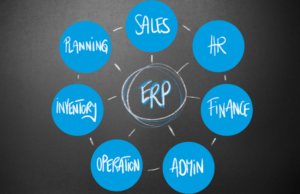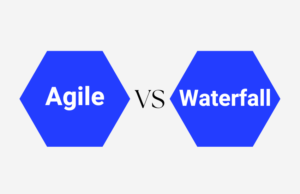Enterprise Resource Planning (ERP) is a set of applications that automate and integrate different business functions of an organization. ERP systems help businesses track and manage key functions of their business throughout their lifecycle. ERP software is usually used to automate, optimize, and integrate key business management functions like accounting and finance, inventory management, human resources, customer relationship management, supply chain management, manufacturing, and project management.
ERP is a complete system that lets businesses handle all of their business tasks in one place.
Enterprise Resource Planning (ERP) is the name given to software that aims to integrate all the critical applications within a business into a single database. By using it, businesses gain access to a centralized database that includes all business applications. ERP modules include inventory management, warehouse management, customer relationship management, accounting and finance, human resources management, and supply chain management, to name a few. In addition to improving the efficiency of business functions, it streamlines business productivity and helps businesses reduce costs. Indeed, having ERP systems gives you access to a wealth of valuable information that can help you make better business decisions.
The benefits of ERP include improved efficiency, increased productivity, and reduced costs.
Enterprise resource planning (ERP) applications can be a powerful tool to help your company improve efficiency, increase productivity, and reduce business costs. Here’s an overview of some of the key benefits of ERP:
Improved efficiency: ERP can help your company improve efficiency by automating many business processes. For example, ERP for human resources can provide an automated timekeeping system, reducing the need to manually enter and process employee timesheets. This can also reduce the amount of time HR employees spend managing employee leave requests.
Improved productivity: ERP can also help your company improve productivity by automating many of the day-to-day tasks and processes that employees perform. For example, ERP software for manufacturing or distribution provides an automated process for tracking inventory, reducing the time employees spend entering and tracking inventory levels. ERP can also automate a lot of the processes in the procurement and supply chain that help keep inventory levels at their best.
Reduced costs: ERP can reduce costs for your company by managing systems more efficiently. For example, ERP can provide an automated process for integrating important information together, which can eliminate the cost of filing information on papers manually.
ERP is an essential tool for businesses of all sizes.
ERP is an essential tool for businesses of all sizes. provides businesses with a unified view of data, enabling them to identify trends and identify opportunities to reduce costs. It also provides a variety of tools that can improve efficiency, ensuring resources are utilized effectively. It simplifies business processes, enabling businesses to improve collaboration. For example, it can eliminate redundant processes using workflow software and automate routine tasks using software robots. ERP systems can also provide businesses with instant access to real-time data, allowing them to make better business decisions. The one and only objective of ERP applications is to run a more efficient business.
Different ERP software delivery models
The ERP software delivery model is not set in stone, much like your ERP. But it is usually determined by the size and scope of your enterprise, and the urgency with which you need a solution. When assessing ERP application vendors, look for one that offers a delivery model that meets your needs and follows best practices. Your vendor should offer a path that progresses from selling, to deployment, to optimization. Here is a breakdown of the various ERP platform delivery models:
ERP software can be delivered in a number of different ways, each with its own set of benefits.
There are a number of different delivery methods through which ERP systems can be delivered, each of which comes with its own set of advantages and disadvantages. One of the primary benefits of an on-premise ERP system is that you get a fully customized solution that can be deployed quickly. The systems can be hosted on your premises on your servers, eliminating the need for third-party hosting costs.
However, an on-premises deployment requires a significant amount of upfront investment. In addition to the costs of making and distributing the software, you will also have to buy the hardware and hire IT staff, which can add up to a lot of money.
Cloud-based modern ERP systems
Cloud ERP, also known as “Software as a Service” (SAAS)-based ERP systems, is another delivery method. The system is hosted on ERP vendor servers and accessed through online web browsers, which eliminates the need to purchase hardware or hire IT staff. With SaaS solutions, you license the software as a service instead of having it deployed on your premises. These software solutions are especially useful for companies with growing mandates and budgets. SaaS solutions can be particularly beneficial for smaller companies that don’t have the resources required to deploy an on-premise ERP system.
Cloud-based ERP systems are becoming more popular because they are flexible, scalable, and affordable, among other things.
Cloud-based ERP software was still considered a futuristic technology. Today, it’s widely used by many industries around the world. The cloud offers several benefits that help increase adoption rates, including:
Flexibility: Being able to access ERP software from anywhere makes it convenient for companies to use. Employees can work remotely, so they don’t have to sit in offices in order to use the software. In addition, companies don’t have to worry about installing and updating software on individual computers.
Scalability: Since cloud storage is centrally managed, companies have access to updated software at all times. As businesses grow, they can increase their investment in cloud-based ERP software since it will grow with them.
Affordability: Cloud-based ERP software is more affordable since there’s no need for companies to install it or hire IT staff to maintain it. It also allows companies to pay only for the amount of software that they need. Cloud-based ERP software is making it easier for companies to manage operations around the world. Because of their flexibility and scalability, cloud-based SAAS ERPs are growing rapidly.
Each delivery model has its own set of benefits, so it’s important to choose the one that best meets your needs.
Each ERP delivery model has its own set of benefits. An on-premise ERP model also referred to as on-premise ERP, gives companies full control over their ERP implementation. The companies’ own data centers are where the data is kept, which is usually safer.
Companies that select an on-premise ERP are responsible for managing their own ERP implementations. An on-premises ERP model has several benefits. Companies have complete control over their implementations. No data is stored or processed on servers owned by third-party service providers. Companies can also make their ERP implementations fit their own business needs.
They can also provide additional training to their ERP users. However, an on-premises ERP has many drawbacks as well. Companies are required to hire ERP implementation specialists, purchase servers, and hire IT professionals to manage these servers. They also need to invest in backup and disaster recovery servers to protect their data. In addition, companies face high deployment costs.
ERP systems improve communication between multiple departments.
Enterprise resource planning software improves communication between departments, allowing employees to more easily share data. For example, employees can access payroll information, customer contact information, inventory levels, and other essential data. In addition, the data can be accessed from various locations, making it easier for employees to work together. For example, a manager can be at the office and access the data, while a salesperson is at a different location and can also access the data. Businesses that don’t have ERP can experience increased operational costs, decreased efficiency, and problems communicating between different departments.
ERP solutions can provide a single view of the business. This can help businesses make better decisions based on accurate data.
Data is the thing on which the busy directors and executives of the company base their decisions and do their strategic planning for the future. Therefore, getting real-time data is the most important part of the decision-making and strategic planning processes. With an ERP system, businesses can access real-time data that provides a single view of the company, helping it make better business decisions based on accurate data.
A real-time view of business
An ERP solution provides a single view of your business, allowing you to see all of your company’s operations. with a single record.
Better reporting
The ERP system provides a wide array of reporting tools that allow you to analyze and present data. You can automate reports and create new ones on demand, helping you make effective business decisions. This information can be used to track how each project is going, figure out where problems are, and plan for future needs.
Improved communication
ERP makes it possible for your departments to communicate and collaborate more effectively. All of the departments can get to the same information, which lets them work together to reach the same goals.
ERP systems can improve customer service. This can lead to increased sales and customer loyalty.
One of the vital roles of ERP is improving customer service and increasing customer loyalty. Improved customer service: When you use an ERP platform to manage your business functions, you can increase productivity without compromising customer service. You can automate manual processes such as purchasing, inventory management, and shipping. This can help improve efficiency, which means you can get a product to your customer faster.CRM systems: With an in-house CRM system, you can store customer data in a single location. You can use CRM systems to automate the sales process and deliver personalized messages to your customers. This can improve customer satisfaction and retention.
ERP reduces the need for manual processing.
An ERP solution can be used to manage core business operations such as accounting and finance, customer relationship management (CRM), supply chain management (SCM), and product lifecycle management. Many ERP solutions can also integrate data from outside sources, such as suppliers, customers, and third-party service providers.
ERP systems are not just for large businesses. Small businesses can reap the same benefits.
Many small business owners believe that ERP systems are only for large corporations and companies with steep IT resources. They are wrong! Small and medium-sized businesses can benefit from ERP solutions just as well as larger businesses. In fact, ERP systems allow small businesses to do more than they ever thought possible.
ERP systems can help small businesses stay afloat during tough economic times.
Large ERPs have been in use by large businesses for decades. However, for smaller businesses, these systems can be too expensive. Fortunately, there are many modern ERP solutions specifically designed for smaller businesses. These systems provide many of the same benefits as large ERP systems, but at a fraction of the cost. One of the most important benefits of ERP systems is that they give businesses the ability to track inventory, manage financials, and manage cash flow. Getting real-time data is the most important thing for any business in any situation. It helps the business plan its next step.
In conclusion
Enterprise resource planning systems (ERP) manage and integrate business functions through a single system. With a better line of sight, companies can better utilize their resources. Without a good ERP application, each department will run on its own and use the system that is only available to them. If the manager of the supply chain wants to see any data, he needs to ask the inventory department or warehouse department. If there is an interconnected system, he can check the level of inventories at any time through his office.
In an organization, error-free communication is a crucial part, and ERP systems play a beneficial role in this by enhancing a better communication culture, which improves productivity and efficiency.
Also, Read this:
9 Reasons – You Should Go For A Custom Software Development Solution
9 Key Reasons – Why Do Companies Outsource Software Development?






